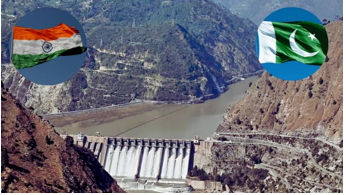i INP-WEALTHPK
Ayesha Saba
Experts have warned that India’s confrontational approach undermines the Indus Waters Treaty (IWT) and threatens regional stability in a time of growing water scarcity.

Talking to WealthPK, Bilal Iqbal, Senior Scientific Officer from the Water Resources Institute of National Agricultural Research Centre (NARC), said the IWT had been a rare success story in Pakistan-India relations, surviving multiple wars and political crises. “However, now New Delhi has taken increasingly aggressive steps to weaponise water against Pakistan.
By fast-tracking hydropower projects on the western rivers — allocated to Pakistan under the treaty — and, worse still, formally suspending the treaty itself, India has taken an alarming step that amounts to hydrological warfare.” He added that Pakistan’s Foreign Office had condemned what it calls India’s "unilateral and provocative" actions, warning that such measures threaten regional stability.
"Any attempt to disrupt the treaty’s implementation is a breach of international law and an affront to Pakistan’s water rights.” “Pakistan’s economy is already under strain, and water scarcity could further exacerbate food insecurity and social unrest. Despite India’s provocations, Pakistan has shown remarkable restraint, emphasising dialogue over confrontation.
This approach is not a sign of weakness but of responsibility — a recognition that water wars benefit no one and that cooperation is the only sustainable path forward,” Iqbal said. He stressed that the World Bank and other third-party mediators need to play a more active role in ensuring compliance and fostering trust. “However, as water scarcity worsens, the treaty’s future remains uncertain.”
Iqbal further said that without genuine cooperation, the region risks a crisis that diplomacy alone may not resolve. Dr Nazeer Ahmed, senior hydrologist at the Pakistan Council of Research in Water Resources (PCRWR), explained that the symbolic suspension of a treaty that had endured through wars sends a worrying signal about the future of regional cooperation.
“The Salal Dam, constructed on the Chenab River, has recently shown zero water flow in satellite visuals, amplifying fears in Pakistan over the deliberate manipulation of water resources,” he said, adding that water has never before been used as a diplomatic weapon between India and Pakistan, even during wars. Ahmed warned that setting such a precedent may introduce a new dimension of conflict in South Asia.
“In a region where nearly two billion people are already vulnerable to environmental stress and economic inequality, the breakdown of trust in transboundary agreements could inflame tensions beyond just India and Pakistan,” he warned. Ahmed said that Pakistan’s position on the matter is just, lawful, and rooted in the principles of equitable water sharing.
“India, on the other hand, is undermining a six-decade-old agreement purely for political leverage. The world must not remain silent as India weaponises water against a downstream nation. The IWT must be safeguarded, and Pakistan’s rights must be protected — for the sake of regional peace, environmental sustainability, and the millions whose lives depend on the Indus,” he stressed.
Credit: INP-WealthPk



